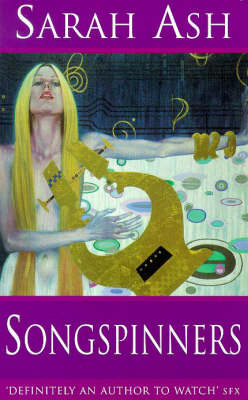
nannah
Written on Dec 21, 2016
This is the sixth work from Sarah Ash that I've read, and it's probably--no, definitely!--my favorite. It's an epic read in a fairly slim novel of 325 pages about religious corruption, finding oneself amid chaos and revolution, grief, dealing with depression from a disability (as someone who experiences the same, let me tell you it's no easy matter), and other important and relevant themes.
Book content warnings:
suicide attempt cw
sexual harassment cw
At the core of Songspinners there are three characters: Orial Magelonne, daughter of the sanatorium's doctor with a musical gift both powerful and deadly; Amaru Khassian, the famous composer and "outlaw" who lost the use of his hands in a fire; and Acir Korentan, a Guerrior of the Rose, dedicating his life to the vision of the poet-prophet Mhir--a vision that also caused the fire in Khassian's opera house.
These three well-crafted and vastly different characters are brought together through events that at first seem unlinked but then swell together in a climax where all their stories mesh in a satisfying and bittersweet way. In the beginning, young Orial Magelonne's existence seems confined to the sanatorium and pleasing her father, though she disobeys his most important rule: avoid music at all cost. Music is in her blood, an urge she can't escape. Amaru Khassian escaped the opera house fire and turns up in Orial's city seeking refuge and medical aid. He meets Orial, and then Orial can't avoid music anymore even if she tried. She becomes Khassian's amanuensis, transcribing his "heretical" opera--and bringing her closer to the madness that killed her mother (the musical gift bestowed upon the Magelonne women shines bright, but only for a short time). Finally, Acir Korentan is sent from the neighboring country to persuade Khassian back, either as a convert to his faith . . . or as a prisoner.
This setup begins the incredibly intricate epic of Songspinners.
Its world is built well and filled with a cast both well-rounded and colorful (from passionate and cranky Antiquarians who refuse to retire to Divas who hide their real feelings under a constant mask of theatrics). It has a mythology that feels vast and ancient and religions that seem genuine and inspire real passion. Scenes leap off the page, and images have stayed with me long after reading the last line.
If I had to make some sort of critique, it'd be about the character Fiammis, the lady assassin. I wish her character had more page time to be given the same care as the other secondary characters. Without that expanded scene time, her character seemed flatter than some of the rest of the cast and I was often told what I should feel toward her rather than experiencing it organically.
A second critique: I wish it was longer! I would have adored this book with 300+ more pages. If only because I love it so much.
